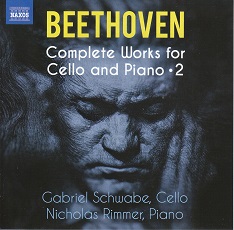Wenn Beethoven in den Cellosonaten das Klavier aus einer Begleiterrolle herausholt, so stellt er es in den Variationen über ‘See the conqu’ring hero comes’ von Händel deutlich in den Vordergrund und gibt dem Cello nur eine nebengeordnete Aufgabe. Wie bereits im ersten Teil der Einspielung der Sonaten nebst weiteren Werken in der Besetzung festigt sich der Eindruck eines fast ringenden Miteinanders der beteiligten Musiker auch in dieser Ausgabe.
Daraus ergeben sich intensive Ausgestaltungen, bei denen beide ihre Position darlegen, ohne den anderen zu übertönen. Das kann dann auch fast mal spröde wirken.
Wenn auch kantable Momente, gerade in der Cellostimme, zu vernehmen sind, so hat man doch vor allem den Eindruck, den vielleicht ob seiner Taubheit genervten Komponisten zu erleben. Diese Gespräche werden intensiv, aber nie verletzend geführt, so dass man sich durchaus der Unterhaltung in Tönen zuhören kann, wobei Zwischentöne zu kurz kommen.
Die Werkauswahl dieses Albums kommt den Interpreten entgegen, als die Variationsfolge auf ein Thema von Händel dem Klavier eindeutig den Vorrang einräumt. Somit besteht keine Gefahr, dass das schnittige Spiel von Nicholas Rimmer hier fehl am Platze ist. Außerdem bietet das Sujet sich für ein prägnantes Spiel an.
If Beethoven takes the piano out of an accompanying role in the cello sonatas, in the variations on “See the conqu’ring hero comes” by Handel he clearly places it in the foreground and only gives the cello a secondary role. As in the first part of the recording of the sonatas and other works with this instrumentation, the impression of an almost wrestling cooperation between the musicians involved is also reinforced in this edition. This results in intense interpretations in which both present their position without drowning out the other. This can almost come across as brittle at times.
Even if there are cantabile moments, especially in the cello part, one has the impression of experiencing the composer, perhaps annoyed by his deafness. These conversations are intense, but never hurtful, so that it is quite possible to listen to the conversation in tones with nuances in between.
The choice of works on this album suits the performers, as the sequence of variations on a theme by Handel clearly gives priority to the piano. This means that there is no danger of Nicholas Rimmer’s racy playing being out of place here. Moreover, the subject lends itself to concise playing.




















